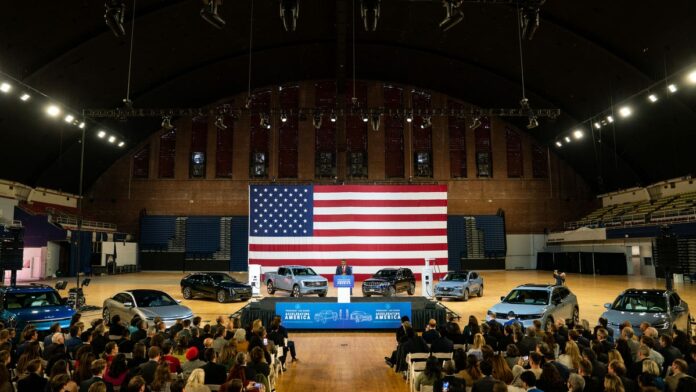Although the U.S. Environmental Protection Agency’s (EPA’s) new restrictive rules on tailpipe emissions have been praised by climate activists and automotive groups, they’re facing pushback from opponents of electric vehicles.
The EPA said that the automotive industry could meet its new standards if 56% of new vehicle sales are electric by 2032, combined with at least 13% plug-in hybrids — and other partial EVs — and more efficient gasoline-powered cars. That would mark a giant leap over current EV sales, which rose to 7.8% of all sales in 2023.
The rules apply to model years 2027 to 2023 and will avoid more than 7 billion tons of carbon emissions that contribute to climate change over the next three decades. It will also provide nearly $100 billion in annual net benefits, such as lower health care costs, according to the federal agency.
The standards, although stringent, are less restrictive than the EPA’s original proposal, which had been criticized by the auto industry as a “stretch goal” last summer.
“Automakers are committed to the EV transition,” John Bozella, the CEO of the Alliance for Automotive Innovation, which represents dozens of automakers, said in a statement. “Moderating the pace of EV adoption was the right call because it prioritizes more reasonable electrification targets in the next few, very critical years of the transition.”
The United Auto Workers labor union, which represents hundreds of thousands of autoworkers, has also supported the EPA’s final rules. But the oil and gas lobby, which has been historically against EVs, disagrees.
“[T]he Biden administration has finalized a regulation that will unequivocally eliminate most new gas cars and traditional hybrids from the U.S. market in less than a decade,” executives of the American Petroleum Institute (API) and American Fuel & Petrochemical Manufacturers (AFPM) said in a joint statement.
The AFPM represents 98% oil refining capacity in the U.S., while the API represents nearly 600 members in the U.S. natural gas and oil industry.
The AFPM has started what it calls a “seven figure” campaign of advertising, phone calls, and text messages against “Biden’s E.P.A. car ban” in seven political swing states like Michigan, Pennsylvania, Ohio, and Montana. However, the regulation is not a ban and does not mandate the sales of EVs.
“This regulation will make new gas-powered vehicles unavailable or prohibitively expensive for most Americans. For them, this wildly unpopular policy is going to feel and function like a ban,” API CEO Mike Sommers and APFM CEO Chet Thompson added.
The EPA’s rules have also been criticized by the National Corn Growers Association (NCGA), which expressed “grave concern” that the actions will devastate farmers. Ethanol, a common fuel used in vehicles, is made by fermenting sugar in grains like corn and barley.
Economists from the University of Nebraska-Lincoln in July estimated that the EPA’s then-proposal could lead to a 50% decrease in the price of corn, removing “well over” $100 billion in farmland value from Iowa, Illinois, Nebraska, Minnesota, and Indiana.
“This decision will not only severely hamper the administration’s ability to reach its own climate goals, but it will also hurt family farms and rural communities that rely heavily on the sale of biofuels,” NGA President Harold Wolle said in a statement. “On top of that, it will remove consumer choice from the market.”


